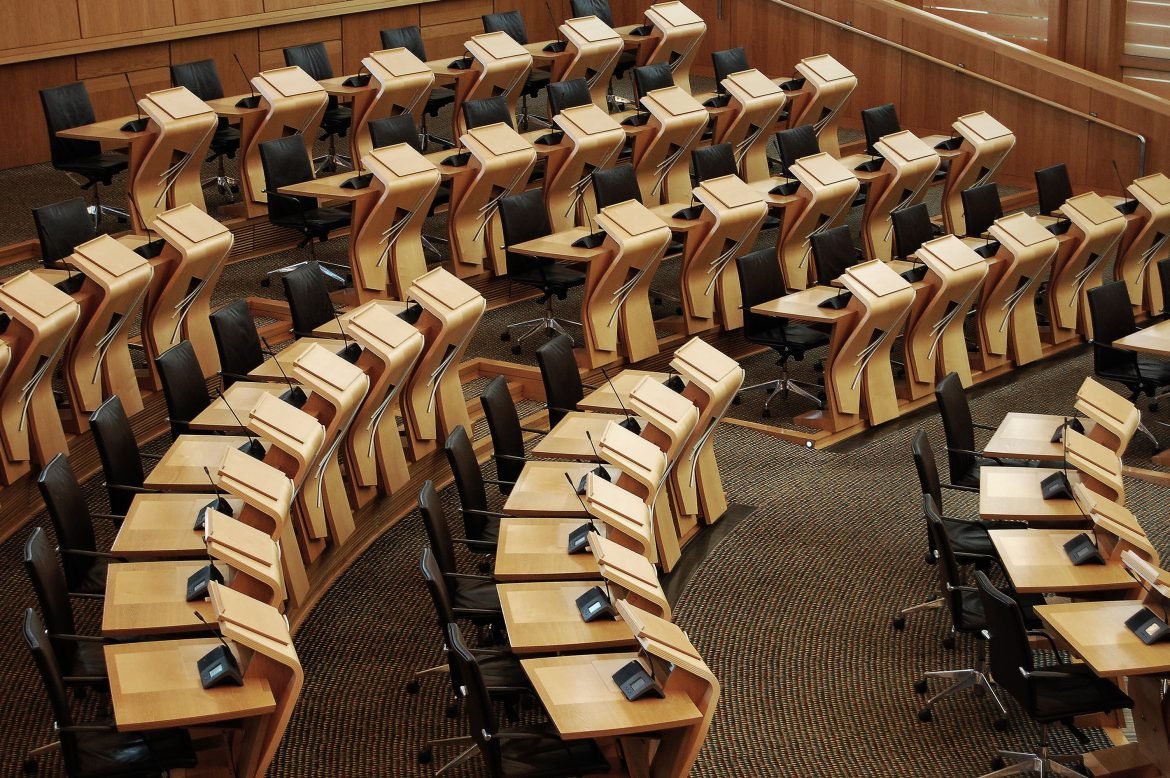What is the Meaning of Government as an Academic Field of Study?
State is an inseparable element of human society that defines laws, policies, and state presentation. But beyond governance, government as an academic field of study opens up a fascinating exploration of political systems, state dynamics, power, and governance methods. Are you the person who has ever wondered about the functioning of governments and how they decide what to do and how they do it on the ground or theoretically? Then this guide is the one you have been waiting to get.
The present blog examines the definition of government as a study, its main functions, and how it relates to other fields of study. Besides that, we shall point out the need to study government to those who are interested in law, governance, or politics.

A horizontal shot of the desks inside of the Scottish parliament building
Government as an Academic Field of Study
At its core, government as an academic field of study focuses on the systematic exploration of political ideas, institutions, and practices. It is commonly referred to as Political Science in educational institutions and encompasses areas like political theories, comparative politics, public administration, and international relations.
The academic study of government gives structure to our understanding of:
-
Political Power and how it operates within societies.
-
The attributes of the state like power, sovereignty, and legitimacy.
-
The interaction between law and governance, shaping everyday life for citizens.
With the integration of the study of the past to the current thinking in terms of data analysis, the field has enabled researchers to criticize the development of systems of governance over time.
What is the point of Government?
Therefore, as social beings, human beings will always be in disagreements when living and working together. In the past, the need for governments appeared in response to conflicts, security, and preservation of citizen welfare. The following are the reasons why governments are vital:
Regulating Society
Laws are made by the government to organize social life and solve conflicts between citizens, contributing to fairness and justice.
Caring about the Vulnerables
A well-established government upholds the rights of minorities and enhances equality in society, thus preventing the mighty from trampling upon the weak.
Welfare and Policy
Governments do this by instituting and implementing policies aimed at improving the overall well-being of citizens, focusing on fundamental aspects like healthcare, education, and infrastructure.
So, governments provide a platform where proper co-existence can be effected.
Basic Duties of Government
Governments carry out numerous significant roles which enable people to co-exist in society. The important ones are:
Lawmaking
The actions, rights, and responsibilities of citizens need to be guided by laws. The legislature formalizes these.
Policy Formulation and Implementation
Policies are written by governments to support the needs of society, whether they regulate resources or propose changes for a better standard of life.
Justice Administration
The judicial arm guarantees neutrality in executing the law and provides means to resolve conflicts, thereby securing individual rights.
These roles cement the notion of governance and are vital for the organization of society.
The Doctrine of Separation of Powers
Separation of powers is one of the features of a democratic state. Separation of powers means that an executive, a legislature, and an independent judiciary should be provided to govern properly:
Executive Branch
It has the responsibility of enforcing laws and running daily activities in the country.
Legislature
Today, the role is mandated with lawmaking, budgetary allocations, and policy approval.
Judiciary
Concentrates on interpreting the law and ensuring justice is fair.
Such a division of duties eliminates the possibility of concentrating too much power in the hands of one entity, thus protecting the democratic process.
The Governmental Field of Study
The academic study of government is vast and spans several specialized areas, including:
Public Administration
Categories related to the development and implementation of government policy, as well as the administration of state services.
International Relations
Studies diplomacy and relations between states and is involved with global governance and the settling of conflicts.
Political Philosophy and Political Theories
Examines the role of political thinkers (Hobbes, Locke, and Machiavelli) to understand ideologies that led to the formation of governance.
Comparative Politics
Examines political systems across different countries to identify strengths, challenges, and best practices.
Each branch contributes to a nuanced understanding of political systems and governance.
The Importance of Government and its Association with Other Disciplines
The studies conducted in government are cross-disciplinary: the government is inclined to use cross-disciplinary orientation to enrich its knowledge:
Economics
Governments are the facilitators of economic policies, thus influencing the allocation of wealth and the growth of nations.
History
History gives the background required to interpret past models of governance and their application in the present era.
Sociology
Descriptions of society in terms of norms, values, and expectations tend to be sources of legitimacy for governing systems.
Philosophy and Psychology
The study of human actions, morals, and ethics can assist in improving the comprehension of governance and leadership.
This inter-disciplinary study makes the study of government a very flexible course.
The Features of a Responsible Government
A responsible government does not purely act as an implementer of laws or annoying policies. This is what characterizes it:
Delivery of Needed Services
Clean water systems, electricity, schools, police, and health services are the characteristic features of a government that takes care of its citizens.
Ensuring Shieldable Support
A government should earn the trust of the citizens within its system, meaning it should be stable.
Encouraging the Good of the People
Proper governance enhances the quality of life and prepares the ground for the development of both a nation and a person.
Based on these qualities, governments ensure they become accountable parties in society.
The Importance of Government Study
Government study is not only for scholars or politicians. It is a valuable step for anyone who wants to:
-
View things and understand the policies that influence day-to-day living.
-
Be an active citizen or politician.
-
Take up careers in diplomacy, governance, or public administration.
Whether it is the design of laws or the knowledge of international relations, the study of government provides the knowledge of how people can give back to their society in a useful way.
Learning about Governance
The study of government as an academic discipline provides both practical and theoretical insights into the political systems shaping our world. Analyzing the main functions, historical context, and philosophical support of governance provides students and researchers with a better understanding of the process of organizing and managing societies.
Want to find out more about this interdisciplinary field in business? Consider enrolling in courses or joining discussions to deepen your understanding of government and political science. And what is government but an understanding of those regulations, systems, and policies that affect our very life?
